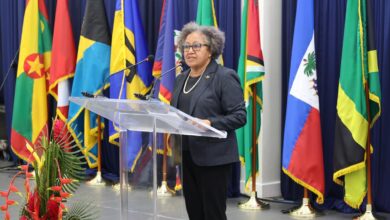|
I thank the CARICOM Secretariat and the general membership of the Pan Caribbean Partnership against HIV and AIDS (PANCAP) for choosing Grenada as the venue for the Ninth Annual General Meeting of the Pan-Caribbean Partnership against HIV and AIDS (PANCAP). On behalf of the Government and people of this “Spice Isle of the Caribbean”, I extend warmest welcome to everyone and I urge you to find some time away from the four walls of the conference room to savour our unique Grenadian hospitality that has made us one of the most attractive destinations in the world for both work and pleasure.
The theme of this meeting “Strengthening the Multisectoral Coalition against HIV and AIDS” is one that resonates with the spirit of the people of Grenada. Fundamentally, the notion of striving towards effective multisectoral action is one that speaks to a “common unity” and a “common purpose” in the pursuit of development, be it family, community or national development. This is a construct that lies buried deep in the Grenadian personality and one for which we have striven since the dawn of our post-colonial period. It was this coalition of positive forces that fortified the Grenadian people during some of the darkest moments of its recent political history. When successive hurricanes flattened Grenada and reduced it to mere rubble in 2004 and again in 2005, it was the indomitable will of a people that had learned to pull and work and build together that allowed a resurgence of the physical and social infrastructure in record time. I take it that this type of broad-based social responsibility is what PANCAP is seeking to engender among all of its partners during this meeting and beyond. In that case, PANCAP could not have chosen a more inspirational venue than Grenada to launch this crusade focused on multi-sectoralism. Chairman, I have been pleased to learn of the phenomenal growth that has occurred within PANCAP since its establishment by the Heads of Government of the Caribbean Community in 2001. The fact that PANCAP now boasts as many as 65 formal members and even more partners and supporters as evidenced by your numbers here is indicative of a universal recognition of the enormous prospects and possibilities that may be drawn from such a coalition of forces as the region seeks to grapple with the HIV epidemic. Furthermore, the fact that in eight short years of existence PANCAP has succeeded in spreading its influence well beyond the Pan-Caribbean region and to attract partners in developed jurisdictions such as Canada, United States, United Kingdom, Federal Republic of Germany and the European Union is a telling vindication of the foresight of the political directorate of the region in creating such an entity. At least on this occasion, the politicians got something right! The progress made by PANCAP, working in tandem with national authorities, in reducing the spread and mitigating the impact of HIV and AIDS in Caribbean is well documented and does not need recital. However, it must remain a matter of grave concern to policy makers and development planners that in a region as small as the Caribbean there are an estimated 230,000 persons living with HIV, and another 20,000 new infections being added to that pool every year. Add to this, 14,000 AIDS-related deaths each year and the picture becomes quite grim indeed. In all probability, the already tenuous HIV and AIDS situation will be exacerbated by the global financial crisis that has placed a virtual stranglehold on the economies of both the developed and developing world, although with more dire consequences for the latter. With declining national incomes due to contractions in the vital tourism sector, falling demand for exports, reduced foreign investment, tightening of capital and dwindling remittances, Caribbean countries would inevitably experience increasing levels of difficulty in financing national development efforts, including the implementation of national HIV and AIDS programmes. I posit that notwithstanding the very serious financial and economic challenges that confront the region, this is not the time to utter cries of despair or to wallow in self-pity. On the contrary, the people of the Caribbean need to seize the moment to reach deep within, marshal all of its not insignificant national and regional resources, and find the resilience to rise above the challenges. My own philosophy instructs me that the path to sustained development is through the consistent nurturing of inner strength and much less so on external sources. Useful as it is, we all know that donor assistance ebbs and flows, but well honed internal capacities are perennial and lead to long term sustainability. One can only ponder the heights to which PANCAP will soar if its partner resources were harnessed into one cohesive thrust that is founded on the principles of common unity, common purpose and equity. I re-affirm my own commitment and that of my colleague Prime Ministers to the ideals of PANCAP. This renewal of purpose was demonstrated at the 18th Conference of Heads of Government of CARICOM held in Belize this past July with a pledge by the political directorate “to consider counterpart contributions from Member States in support of the Caribbean Regional Strategic Framework on HIV and AIDS, 2008-2012”. We see this as yet another step in stimulating the multisectoral coalition within the framework of PANCAP. Chairman, I have had a cursory look at the agenda for this meeting and I am impressed with the range of issues that will be ventilated over the next two days. I assure you of a strong Grenadian voice led by Senator the Hon. Anne Peters, Minister of Health. I would be particularly interested to learn of the outcome of the deliberations around policy reform as it relates to stigma and discrimination, as well as the discourse on the development of the PANCAP Constitution. Once again, it has been my very great pleasure to be associated with this phenomenal movement and wish this Ninth Annual General Meeting of PANCAP outstanding success. |
Press ReleasesStatements and Declarations





